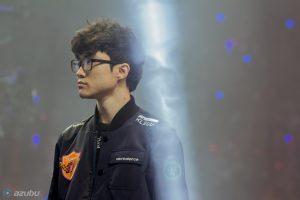Watching the North American League of Legends Championship Series (NALCS) on a Saturday afternoon, I was captivated by the shout casters’ conversation concerning personal motivation and the longevity of professional esports careers. It was an interesting dispute, as they seemed to attribute motivation to just only affect players’ willingness to continue a career, not their achievements.

Lee “Faker” Sang-hyeok at the 2016 League of Legends World Championships
Out of the six League of Legends World Championships, South Korea’s SK Telecom (abbreviated as SKT) has taken the first place trophy in rather dominating fashion for three of them. However, what may be most surprising is that for each of their championship wins, the starting roster has shuffled many times. Despite this, there always remains a constant, that being the presence of what many consider the greatest League of Legends player of all time, Lee “Faker” Sang-hyeok.
Knowing these facts, the aforementioned conversation sparked my interest in the aspects of motivation that we have studied. This is due to Faker on several occasions touting his personal motivation as an agent for his overwhelming success. Having noted this, the aforementioned conversation got myself thinking: which type of motivator introduced in Comm 292 would be most effective in changing performance?
Referring to an interview by Faker following a semi-final victory during the 2015 World Championships, he states that “the prize money is … definitely a source of motivation, but really what I want is to win another World Championship title” (1). This shows that while the grand prize of $1 million USD remains an incredibly great extrinsic motivator for the world champion, that through intrinsic factors does he strive to perform at his best. As such, is it that intrinsic motivators are more effective in increasing performance?
While the textbook does not agree that in all cases intrinsic motivators keep people more driven and performance-orientated, it does state that “intrinsic and extrinsic motivation mat reflect the situation … rather than individual personalities” (2). In the case of Faker being on track to win his second world championship, this description of the motivators makes absolute sense. By this time, Faker had already acquired an amount of money unfathomable to almost all 19 year olds, his team winning the million dollar prize in 2013. Therefore in this situation, money, being an extrinsic factor, was clearly not as appealing as creating a legacy, and establishing what would become the most dominant organization in League of Legends History.
From this connection, it was clear to me that the effectiveness of motivators are highly dependent on the situation, and should be implemented as per case basis. Furthermore, these motivators can be highly effective, encouraging some to become the best in their field.
- “Why Faker is the world’s best League of Legends player – an interview with “god”.” PCGamesN. N.p., 26 Oct. 2015. Web. 02 Feb. 2017. <https://www.pcgamesn.com/league-of-legends/why-faker-is-the-worlds-best-league-of-legends-player-an-interview-with-god>.
- Langton, Robbins, Judge, Organizational Behaviour, 7th edition, p. 128.